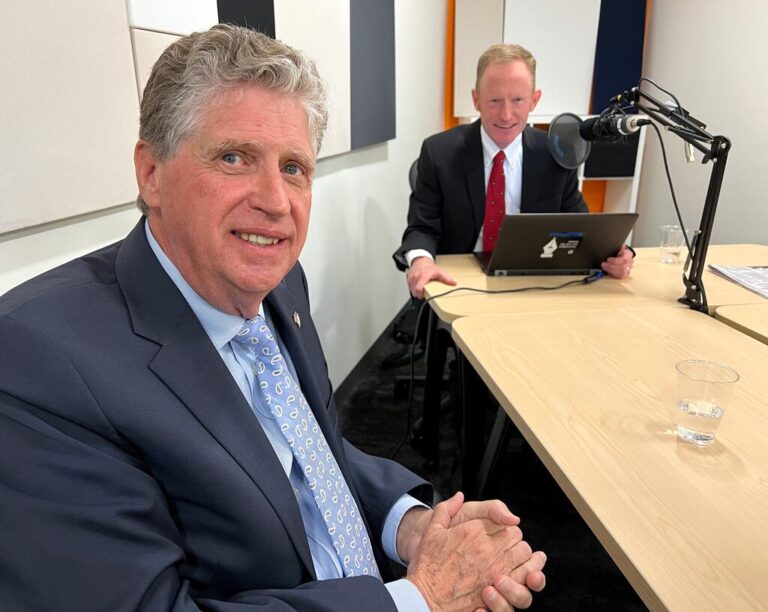For the second year in a row, the Rhode Island Report podcast has been named best podcast in the New England Newspaper & Press Association’s New England Better Newspaper Competition.
My colleague Ed Fitzpatrick is a humble guy, but he’s the brains – and voice – behind the weekly show, so I asked him to take us behind the scenes and tell us what he’s learned about the wild world of podcasts.
Rhode Island Report is about to celebrate its 200th show with a live event held at Rhode Island PBS. Ed has more on that below, too.
Q: Aside from your perfectly Rhode Island accent, what has made the podcast such a success?
Fitzpatrick: The podcast succeeds because we stay on top of the news, breaking stories and adding perspective to the big Rhode Island issues while listening to voices that might not otherwise be heard. It succeeds because of our great partnership with Rhode Island PBS. And it succeeds because we have a dream team in producer Megan Hall, editors Lylah Alphonse and Maria Caporizzo, plus reporters Amanda Milkovits, Dan McGowan, Steph Machado, Alexa Gagosz, Carlos Munoz, Chris Gavin, and Omar Mohammed.
Q: You’ve had a lot of different roles in journalism, but it’s so fun to watch you get so much joy out of the podcast. What’s the biggest difference between print and audio for you as a journalist?
Fitzpatrick: I get a kick out of it because it’s a whole new way to tell the stories of Rhode Island. You can hear so much that you would never pick up in a print article, whether it’s the sound of the pinball machines at Pawtucket’s Electromagnetic Pinball Museum or the customers in line at the Mr. Lemon lemonade stand, whether it’s the sound of gubernatorial candidate Ashley Kalus boxing with me or Governor Daniel J. McKee getting angry with me.
Q: Rhode Island Report has made plenty of headlines since you launched. Tell us about some of your favorite moments from the podcast.
Fitzpatrick: Our most popular episode was “How to Talk Like a Rhode Islander.” Not only did dialect coach Thom Jones teach producer Megan Hall how to speak like me, he also analyzed a message sent to the Globe by former state representative Joanne Giannini, who’s on the Mount Rushmore of great Rhode Island State House accents. Also, I’ve been moved by the accounts of the refugees who escaped slavery in Mauritania and female genital mutilation in Senegal, as well as the Afghan student who escaped the Taliban and created a school for the girls left behind.
Q: You’re about to celebrate the 200th episode of Rhode Island Report, and you’re hosting a live event to mark the occasion. What should we expect from that event?
Fitzpatrick: Join us April 22 for “Rhode Island Report, Live: Washington decisions, Ocean State impact.” US Senator Jack Reed and US Congressman Gabe Amo will take part in a live, in-studio discussion about the impact that decisions and discussions in D.C. have on R.I. I’ll ask questions along with Jim Hummel, host of RI PBS’ “A Lively Experiment,” as we mark the 200th episode and celebrate the partnership between Globe Rhode Island and Rhode Island PBS. The event runs 5:30 to 7:30 p.m. at RI PBS Studios, 50 Park Lane, Providence. It will air as a special episode of “A Lively Experiment” and the Rhode Island Report podcast. It’s free, but register here.
This story first appeared in Rhode Map, our free newsletter about Rhode Island that also contains information about local events, links to interesting stories, and more. If you’d like to receive it via email Monday through Friday, you can sign up here.



Comment count: